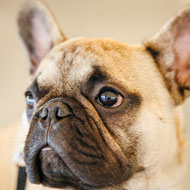Comic Relief apologises over French bulldog t-shirt

Figures from the Kennel Club suggest French bulldogs are set to overtake Labradors as the UK’s most popular breed, having seen a surge in popularity in recent years.
Comic Relief has apologised for using a brachycephalic breed in its campaign merchandise this year, following a letter from the BVA calling for it to remove products featuring a French bulldog.
Responding to the BVA’s concerns, Comic Relief said it was previously unaware of the issues regarding brachycephalic breeds. The charity pledged to work with the BVA on any future projects using animal imagery.
Comic Relief launched its annual t-shirt fundraising campaign last month, with high street retailer TK Maxx. One of its t-shirts, which features French bulldog ‘Albert’ prompted the BVA to write a letter highlighting the serious and often life-limiting health problems suffered by these breeds.
Acknowledging the good work of Comic Relief, BVA president Gudrun Ravetz explained that demand for brachycephalic breeds is being fuelled by their visibility in the media and celebrity endorsements.
Figures from the Kennel Club suggest French bulldogs are set to overtake Labradors as the UK’s most popular breed, having seen a surge in popularity in recent years.
Ms Ravetz asked Comic Relief to remove the t-shirts and other merchandise containing Albert’s image, and to seek veterinary advice on future campaigns using animal imagery.
The charity responded last week by saying it would be very difficult to withdraw the t-shirts from sale at this late stage in their campaign (which ends 24 March), but it would like to consult the BVA on future campaigns using animal imagery.
Michele Settle, director of UK campaigns and brands, commented: “We take animal welfare very seriously and when using animals in our campaigns we make all efforts to ensure that the animals are treated well. We are not aware of the specific issues you raise regarding brachycephalic breeds.”
Ms Ravetz said the response was “encouraging” but highlights the lack of awareness regarding brachycephalic issues.
“Comic Relief t-shirts help raise so much money for good causes at home and overseas, however we wanted to highlight the poor animal health and welfare being perpetuated by the use of 'Albert' on their merchandise,” she explained.
“Whilst we were very pleased to get a positive response, it highlights how many companies do not understand the significant health and welfare problems brachycephalic breeds can suffer, emphasising how important it is that vets continue to speak out on this issue.”



 The Veterinary Medicines Directorate (VMD) is inviting applications from veterinary students to attend a one-week extramural studies (EMS) placement in July 2026.
The Veterinary Medicines Directorate (VMD) is inviting applications from veterinary students to attend a one-week extramural studies (EMS) placement in July 2026.